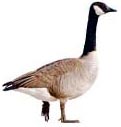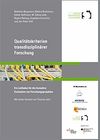Quality Criteria of Transdisciplinary Research A Guide for the Formative Evaluation of Research
The Evaluation Network for Transdisciplinary Research has spent several years working on the question of how the quality of transdisciplinary research processes can be secured and evaluated. As the central result, the “Guide for the Formative Evaluation of Research Projects” was published in the German language at the end of 2005. The Guide is now also electronically available in English.
In transdisciplinary research projects, experts from various fields and disciplines and from the realm of practice must work together to be able to treat the complex problematic of the research object. Conventional processes of evaluation and quality assurance that are adequate for disciplinary assessment cannot be directly applied to research possessing this diversity, which implies specific forms of collaboration, differentiation and integration, methods and theories. Evalunet has produced this guide to rectify this lack of criteria and methods of evaluation.
Under the auspices of the Institute for Social-Ecological Research (ISOE), researchers from five institutes of the research network ökoforum have analyzed six transdisciplinary projects, taking a broad spectrum of research content and project settings into consideration. All project assessments and also the identification of essential quality criteria were carried out in intensive analytical discourses with a total of about 80 experts. This work, supported by empirical, analytical discourse, has resulted in a criteria catalog for the evaluation and quality assurance of transdisciplinary research projects.
The guide contains detailed descriptions of quality criteria and also makes statements on methodological and processual questions. It serves primarily the purpose of the evaluation of transdisciplinary research projects, whereby this instrument is tailored to the aspect of learning from the process of evaluation (formative evaluation) and presupposes a discourse between the project participants and the evaluators (discursive evaluation). As an alternative to evaluation using the detailed criteria, a less extensive evaluation using a selection of criteria (basic criteria) is also possible. The quality criteria can also be used to conceive new transdisciplinary research projects. A special feature of the electronic version is that internal links in the document make it possible to switch comfortably from the basic to the detailed criteria and vice versa.



